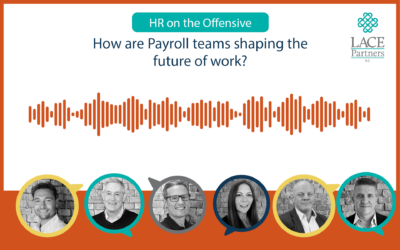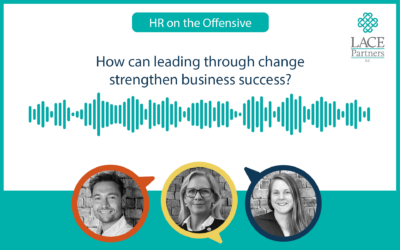Back in July, we published our HR Shared Services Trends 2022 report. Since then, senior HR Shared Services professionals have noted several consistent themes emerging within their businesses.
Recently we gathered senior HRSS people and homed in on a specific part of our report – ‘what skills and capabilities are needed to deliver an efficient and productive team’. Here’s what we learned.
The attrition question – HR Shared Services as a ‘steppingstone’
For some, Shared Services is seen as a gateway or steppingstone to HR. Somewhere to test the waters and find out whether HR is really for them, and when it isn’t they simply move on. Members talked about the shifts from HRSS to other teams within HR, such as Employee Relations, that they commonly see in their businesses.
This is a lot to do with the widely held perception of Shared Services as an administrative function, rather than a team that offers the opportunity to learn and grow. As a result, the majority of businesses target entry-level professionals and graduates to fill these spaces.
While there’s often a perception that it’s always a negative to see people move on after two years to advance their careers, this isn’t necessarily so. Attrition is not intrinsically ‘bad’, and allowing people to move on and do what’s right for them is important – whether that’s within or outside of the business.
The challenge of providing a realistic career progression mechanism was mentioned by some attendees. This is more of a challenge for smaller businesses, as the extra challenge of finding replacements also bites. However, finding ways to combat this should be balanced with the inevitability of people moving on. The only time people leaving should be cause for regret is if they truly had more to give and, while in Shared Services, failed to develop themselves.
Empowering people to grow their career confidently
Finding ways to ensure people feel empowered within Shared Services is a key challenge for many businesses. And this is an area that deserves the spotlight. By enabling teams to feel confident and empowered enough to manage themselves, businesses will reap rewards in a number of ways.
For example, employees that can see and feel the business investing in their career path will contribute to confidence to utilise and evolve their skills base. They will be able to learn all kinds of transferable skills that will help to progress their career.
Not all employees are created equal, of course. Their individual background trajectory will go on to impact the way they are able to embed within the team. For example, those coming from a manufacturing to a financial services background, may need different levels of support to feel as empowered as others.
HRSS – more than straight up admin
Tying the need to empower individuals and teams together is properly managing HRSS’s reputation. HRSS leaders need to drive up the perception of the function as more than just admin.
Encouraging individuals to be more purpose-driven is a great way to do just that. Furnishing people with the knowledge and understanding of how they fit into the wider business and make a difference is absolutely key.
In other words, leaders need to flip the script and sell the opportunities that exist within HRSS. Yes, administrative skills are necessary but there’s far more to HRSS. Automation and improved technology has removed the need for the kind of tier 0 admin, allowing teams to focus on different skills and tasks.
Moving into 2023, HRSS needs to shift external perception from cost production to value-driven. This will only drive improvement within the team and make it far more attractive to skilled newcomers.
What skills and capabilities are HRSS leaders looking for?
Mindset is as important as administrative and technical skills. Some businesses are waking up to this by seeking out new starters that come equipped with an analytical mindset. This alone will help to drive up the capabilities of HRSS people and invigorate teams with a collective desire to grow and improve.
An increasing number of leaders now also look for people who can work productively and effectively within a hybrid (or completely remote) workforce. Hitting this balance is essential in a post pandemic workspace.
Skills and behaviours needed for HRSS vary according to each organisation and its leadership style, of course. One size does not fit all. Having said that, our discussion uncovered the following commonalities in leader’s wish lists for new team members:
- The ability to think outside of the box
- People who can ‘think around corners’
- Being outcome orientated – this was defined as looking at the end goal first and working backwards to find solutions
- Linking strongly to a strong customer services mindset
- The ability to analyse and interpret data and to then use it to translate into tangible actions
- Project management skills
How can leaders develop out these skills?
The next question we discussed was around how best to develop these skills when people join HRSS. Upskilling has been, and continues to be, important in our post pandemic climate – but how to go about it? The consensus was that success involved a variety of methods and factors.
These included; mentoring, ad hoc coaching, being available to people, giving them enough space to learn, network and feel empowered, and allowing them to find ways to further their own skills and knowledge.
Turning towards official qualifications, members questioned whether CIPD qualifications are enough. The perception exists that outside of HR, CIPD appear important but they lack global reach and when you’re inside HR, they shift to become less integral.
The question of whether there should be a specific HRSS qualification arose. There is definitely scope for something that would not only boost the quality of recruits, but also raise the external perception of the function.
Finding and securing talent for HRSS
Referral is still a key part of talent finding for HRSS leaders, coming as it does with validation from a trusted source. The focus is also shifting towards ‘hiring for attitude’. As long as the mindset, aptitude and ability is there, skills and capabilities can be taught.
Leadership is also key for attracting talent to an organisation – inspirational leaders can drive people to board the ship. Of course, the brand helps but leaders play a huge part in convincing talent to join.
And finally…
As the world continues to move on from COVID-19 and settles into adjusted ways of working HRSS continues to evolve. From finding to retaining talent, and from managing attrition levels to creating pathways for individuals to develop their careers, HRSS teams have enormous potential.
If you’re an HRSS leader and would like to take part in our ongoing forum discussions next year, simply fill in the form below. Or, if you want to assess the skills and capabilities of your team and want advice on how to start and what to look for, you can also contact us below.






